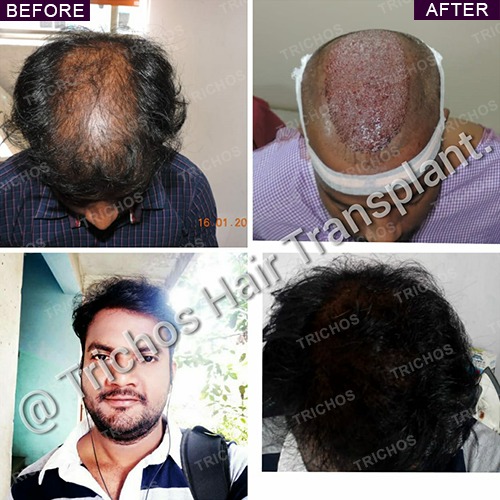Can PRP Done in the Wrong Way, Lead to Hair fall?
This is not commonly known but non-surgical treatment done in the wrong way or planned improperly may lead to hair fall instead of hair growth!
This procedure needs to be performed at a clinic/hospital that follows all precautions to prevent possible infection.
In this educational video, Dr John Watts – a noted dermatologist, trichologist and hair transplant surgeon in Hyderabad – explores this important topic and explains the adverse side effects if non-surgical treatment is carried out without following proper protocol or in an unplanned manner. He has successfully performed over 1900+ hair transplant procedures so far.
Introduction:
The purpose of undertaking non-surgical treatment is to ensure hair growth and prevent further hair thinning but these goals may not be reached if certain conditions are not followed in this procedure. Though one cannot expect full length dense growing hair with non-surgical treatment, it still helps in controlling hair thinning problem by growing baby hair and ensures some density.
For the viewers of his popular YouTube channel, Dr John Watts lists out the following adverse side effects that may be unintentional or due to a wrong non-surgical treatment protocol or method performed at the clinic.
Pain:
In general, anaesthesia is administered for performing non-surgical treatment. But one may experience some amount of pain post non-surgical treatment and occasionally mild discomfort. In some cases, the patients may face severe discomfort if they do not follow instructions correctly and takes up driving immediately, exposing the sensitive region of the scalp to injury.
Hair Fall:
Normally, one may witness hair fall after the first or second non-surgical treatment session but it is normal as it would be stabilised in a subsequent session. In general, a person may lose around 60-100 hair a day but it is regarded as normal.
However, post-non-surgical treatment, if there is excess hair fall, one needs to consult one’s dermatologist for reassessment.
Scalp Fibrosis:
In scalp fibrosis, one may notice inflammation. This happens if one takes up non-surgical treatment sessions in quick sessions with an average gap of 5-6 days. “This should be avoided as the ideal gap between two sessions of non-surgical treatment ought to be 15-25 days as the scalp needs to heal after the first session,” informed Dr John.
In non-surgical treatment, the scalp faces some light inflammation but it is natural as it heals on its own soon. But it can get aggravated if due to wrong guidance, a patient takes up non-surgical treatment in quick succession with a minimum number of days as a gap. This does not leave sufficient time for the healing process and it may lead to a condition called scalp fibrosis.
Infection:
The non-surgical treatment process needs to be undertaken in a safe, sterilized and aseptic environment. “Even the kits used for non-surgical treatment need to be sterilized and the staff of the clinic/hospital needs to follow safety protocol. If this is missed, it may lead to infection on the scalp,” warned Dr John.
Hence, scalp infection-induced hair loss is also a possibility if one is not careful.
Poor Results:
There is also a likelihood of getting no results or very poor results from non-surgical treatment if it is undertaken without following scientific protocol like mandatory tests and proper counselling by the dermatologist. “The patient’s platelet count, B12 and vitamin D levels and other factors like stress levels, nutritional deficiency and sleep and rest pattern need to be considered before non-surgical treatment is planned as they play an important role on the results,” said Dr Watts.
Conclusion:
In his conclusion, Dr John advised patients to get proper counselling from their dermatologist before undertaking the procedure. “If you do not get proper assurance from your doctor, then it is better not to go ahead with non-surgical treatment,” he said while urging viewers to share the video for awareness.
Trichos provides state-of-the-art treatment for various hair loss conditions and offers advanced hair transplant solutions. Call us Today for a Life-Changing Experience.
Book an appointment for expert guidance


About
Causes
Alopecia
Restoration
Procedures
Locations
Disclaimer: While hair transplants are generally safe and effective, as with any medical procedure, there can be minimal and temporary side effects based on specific or underlying medical condition of the individual patient. Please consult in person with our qualified medical team at Trichos for a thorough assessment of your specific condition and individualized guidance on the potential risks and benefits associated with our hair restoration treatments.
Learn more about Medical Consent for Surgeries.



